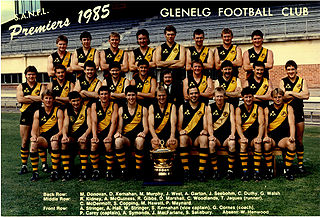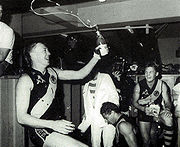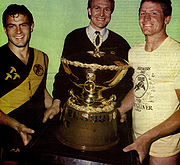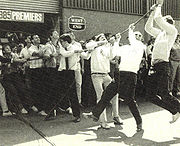COURAGE CONQUERS THAT FINALS HOODO!
'
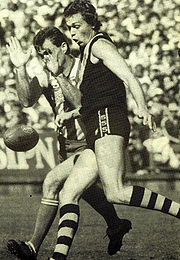
Adam Garton kicks one of his 4 goals during the 1985 grand final
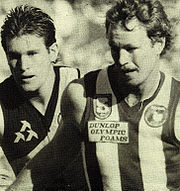
Glenelg's Wayne Henwood and North's Mike Parsons during the 1985 grand final.
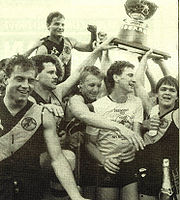
Celebrations begin after the 1985 grand final.
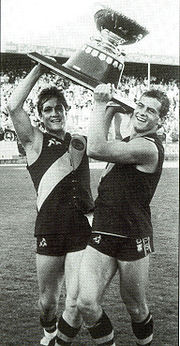
Peter Maynard and Tony McGuiness with the Thomas Seymour trophy after Glenelg defeat North Adelaide in the 1985 Grand Final.
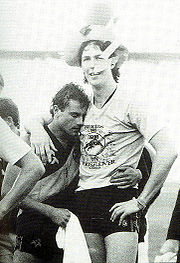
Tony McGuiness and Stephen Kernahan after Glenelg defeat North Adelaide in the 1985 Grand Final.
By Geoff Kingston
Glenelg's 57-point league football grand final victory over North Adelaide will live in the hearts of people forever. That it should do so; that Glenelg's fame arose from the destruction of North, is a tough fact of life.
When the flattery of the crowd has stopped ringing in players' ears, when the champagne bubbles of celebration have burst, the 1985 premiership will be remembered as the result of Gleneig's epidemic courage.
Down five goals in the second quarter the Glenelg players watched their hard work of winter perishing so fruitlessly. They were doing and dying and seemed headed for destruction themselves. Coach Graham Comes, squirming uncomfortably in his boundary-line bunker, was angry and frustrated.
"I couldn't believe it," he said afterwards. "I was so unhappy. The discipline was poor and they were ignoring instructions." He was later to remark that he couldn't "understand how they could play so badly then play so well."
Maybe he has not yet noticed that fate is usually on the side of the best team. Certainly something triggered Glenelg. In six dramatic minutes midway into the second term Glenelg began a revival carried in to an emotional triumph - and only its third premiership in its 65 year history.
It turned the game around with five goals in six minutes to convert a five-goal do into a 12 point lead at half-time and it was never again seriously challenged. In that one short but hectic extravaganza by Glenelg, North's demise came quickly and painfully.
And with the premiership in jeopardy the grand final erupted in a chaotic third quater when players from both sides tried to frighten each other with tactics not us espoused by the Marquis of Queensberry.
If the second-quarter blitz by Glenelg was the beginning of the end for North Adelaide the third quarter signalled the absolute capitulation.
With spiteful acts exploding like hand grenades all over the ground, North players in particular lost sight of one of their targets. Too many of them either backed out of the game or tiptoed around Football Park in a way that gave the side no chance of victory against the fiercely intimidating Glenelg outfit.
North seemed as though it was going to inflict a humiliating defeat on Glenelg when it careered to an impressive 7.5 to 2.6 lead midway through the first term. Ruckman Mike Redden led North's charge of the height brigade with a superb opening against Wayne Henwood, while near the goal square Mike Parsons, who must surely do his training on a pogo stick, was embarrassing Chris Duthy. So threatening were Redden and Parsons that Comes was forced to switch Henwood to full back to combat Parsons - a job he achieved with remarkable success; with Peter Carey then having to do almost all the ruck work for the rest of the game. Carey, one of the last of the dinosaurs, was a long way from his giant-killing days of the past but his worth on Football Park on Saturday was inestimable.
North rover Tony Antrobus was also irritating Glenelg - and a large chunk of the 50,289 crowd. His skill and tactics unbalanced Glenelg repeatedly in the first half and it was a tribute to his resilience that he survived the game.
It has just about got to the stage where Antrobus might consider taking a "minder" with him wherever he plays.
North was also succeeding on the wings where the artful Matthew Campell and Brenton Phillips were reliable sources of supply.
But in the third term, reminded by Comes that "this is the most important quarter of football this year," Glenelg, which until then had been a team of wandering impulses applied itself 100 percent to winning. And while the North players were doing other things Glenelg was robbing them of the game.
Chris McDermott was inspirational. He was a hero to the Glenelg crowd- a society founded on hero worship. But so also were rover Tony McGuinness, half-forward Tony Symonds, Peter Maynard and half-forward David Marshall. Their different skills provided an avalanche of scoring opportunities that finally overwhelmed North.
Then in defence, were Ross Gibbs and Henwood - the former Sandgropers doing everything but groping. A curious mix of brute power and cool arrogance played according to the defender's commandment - "Thou shalt not pass."
But the biggest monument in the game was Glenelg centre half-forward Stephen Kernahan, who won the Jack Oatey Medal as best afield. He was the Glenelg heart, the one player North never controlled, never subdued. After a worrying start, he imposed his special dignity on the game and probably more than anyone else started the alarm bells ringing for North.
And as the sounds of failure echoed inside the heads of the North players, unbridled joy welled in the eyes of the Gleneig players, overflowed down their cheeks and allowed them to hug and kiss each other in celebration of a memorable victory.
